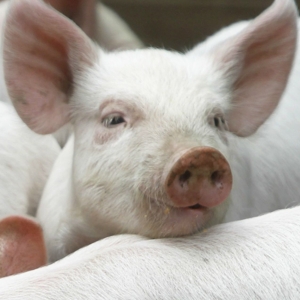With all the promotion and positive love the Mediterranean Diet has been getting from medical and dietary experts over the past few years, you’d think it would be hard to improve on it. But Australian researchers have gone the original one better by adding Pork! And there are side benefits…
 Lovely Lean Pork Chops: Soaking in a Tarragon-based marinade
Lovely Lean Pork Chops: Soaking in a Tarragon-based marinade
in preparation for the grill. Just one way to ease ‘the
other white meat’ into the Med Diet…
Aussies love their meat, says the abstract of the study report on the ‘Pork’ project. In fact, they are among the world’s top consumers of meat, averaging nearly 100 kg / 220 lb. per person per year. That’s been nailed by dieticians as a contributing cause to another (unenviable) distinction Australians hold: their national diet is notoriously poor, nutritionally. Researchers at University of South Australia (UniSA) wanted to see what they could to to lure more of their countrymen to the internationally renowned Med Diet without upsetting their meat-loving palates.
What they did
“The Mediterranean diet is widely accepted as the world’s healthiest diet and is renowned for delivering improved cardiovascular and cognitive health, but in Western cultures, the red meat restrictions of the diet could make it hard for people to stick to,” says UniSA researcher Dr Alexandra Wade.
The idea was to see whether Pork – less damaging to your heart and less damaging to the environment than Beef – could be introduced into the Med Diet in place of some servings of Chicken and Fish to help make the healthier diet more acceptable to the average Aussie.
What they found
After some calculations and some clinical trials, they determined that 2 to 3 servings of lean Pork per week could be subbed into the Med Diet without degrading the benefits of the plan, which relies heavily on poultry, fish and seafood as animal proteins.
The study compared the cognitive effects of people aged 45-80 years and at risk of cardiovascular disease following a Med-Pork or a low-fat diet (often prescribed to negate risk factors for cardiovascular disease), finding that the Med-Pork intervention outperformed the low-fat diet, delivering higher cognitive processing speeds and emotional functioning, both of which are markers of good mental health.
“This bodes well for our aging population, where age-associated diseases, such as dementia, are on the rise,” Wade says.
But that’s not all.
“When you add the fact that pork production emits only a fraction of the greenhouse gases compared to beef, and the Med-Pork diet is really ticking all boxes – taste, health and environment,” Wade notes.
The takeaway
According to the World Health Organization (WHO), by 2050, the number of people aged 60 years and older will outnumber children younger than five years old, bringing common health concerns associated with ageing into the fore. Further WHO statistics shows that cardiovascular disease is the number 1 cause of death globally and that dementia is one of the major causes of disability and dependency among older people worldwide.
“We’re hoping that more people will find this dietary pattern to be more in line with their accustomed eating patterns and therefore more adoptable,” Wade says.
My take
I love everything about this new version of the Med Diet. Of course, it’s still hard for some folks to follow because of the high cost of Produce and Fish/Seafood. Giving the average person the option of substituting some servings each week of less-expensive Pork in place of Fish will definitely make the whole Diet more approachable for them. And who knew that eating Pork (albeit under ‘controlled conditions’) could help keep your brain sharp?
An old slogan used by Pork producers way back in the 1980s to promote its healthfulness seems to have come full circle: “Pork: The other white Meat!”
~ Maggie J.

